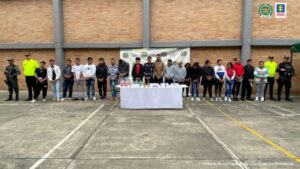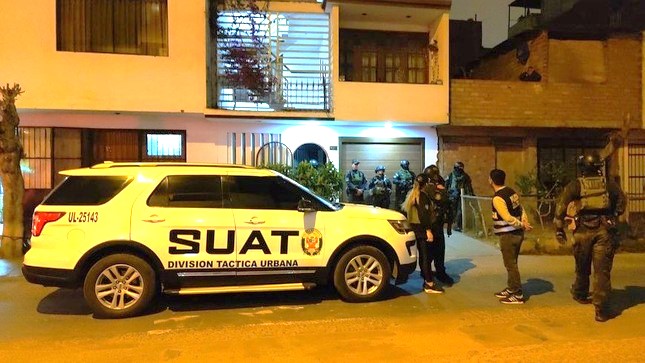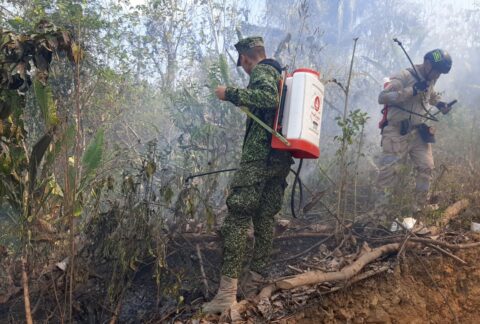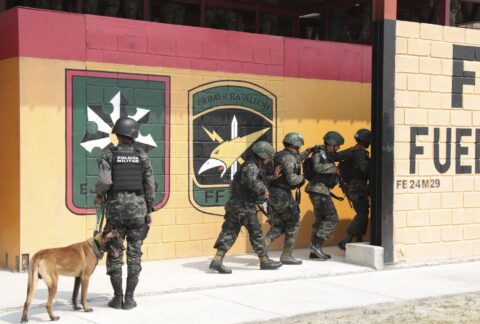In the months following the COVID-19 pandemic, the Venezuelan criminal group Tren de Aragua deepened its position in at least seven Latin American countries, with the consent of the Nicolás Maduro regime.
According to nongovernmental organization (NGO) Transparencia Venezuela, the Tren de Aragua can be described as a “mega-gang,” which resulted from the combination of various criminal groups. It is the “largest and most powerful organization in Venezuela” with more than 4,000 criminals. Its kingpin, Héctor Rutherford Guerrero Flores, leads from the Tocorón Judicial Prison in Aragua state, a jail located 90 kilometers from the capital, Caracas.
Jorge Govea, a representative of the Venezuelan Violence Observatory NGO, told Diálogo on July 8 that the international expansion of the Tren de Aragua began between 2017 and 2018, as economic opportunities diminished in the country due to the complex humanitarian crisis. Criminals then took advantage of the waves of migrants.
“The most important factor is economic profit in illicit activities. Wherever there is an opportunity, they act in an almost entrepreneurial way […],” Govea said. “They begin to exploit this in neighboring countries; they begin to emigrate. They no longer are alliances with gangs from other countries, but they themselves in person. They follow the route of Venezuelan migrants.”
As such, among the first undertakings of members of the Tren de Aragua was to secure the control of border crossings from the south of Zulia state to Apure, Govea said.

According to Transparencia Venezuela, in five years, the Tren de Aragua had positioned itself in Colombia, Ecuador, Peru, Chile, Brazil, Bolivia, and Costa Rica.
In a December 2022 report, Chile’s Drug Trafficking Observatory, part of the Chilean Attorney General’s Office, highlighted extreme violence as a characteristic of members of the Tren de Aragua.
Both in Chile and Colombia, governments and regional entities such as the mayor’s office of Bogotá, are urging the Venezuelan regime to act against the Tren de Aragua, since the criminal organization operates from a facility that should be under the control of the regime.
In the last week of July, the Colombian police reported the capture of 23 alleged members of this organization. They are accused of extorting money from traders and sex workers and of small-scale drug trafficking. Mayor of Bogotá Claudia López said that they had received “no support” from Venezuelan authorities in identifying and apprehending these criminals, despite requests for help through official channels.
“Maduro’s inaction is due to the fact that the Tren de Aragua is a kind of armed wing of his regime,” Venezuelan journalist and researcher Ronna Rísquez told Diálogo. ‘The regime, not only that of Maduro but also that of [Hugo] Chávez, quickly understood that it could have these types of organizations like the colectivos [paramilitary] or mega-gangs at its service, and it uses them for whatever it needs.”
Director of U.S.-based think tank Center for a Secure Free Society Joseph Humire also suspects that the Tren de Aragua “receives the support of the Maduro regime.”
According to Rísquez, this situation will not change in the immediate future, as the Tren de Aragua will serve the purposes of the Venezuelan ruling party during election year.
“Maduro does not know if he is going to need the Tren de Aragua next year [2024] to repress a protest or for them to help him in something else. He’s not going to change that at this point,” Rísquez said.
Looking north
The next step in the expansion process of this Venezuelan criminal group is the United States. According to Rísquez, there is information that leaders of the organization who were in Chile have begun the journey to the United States through the Darién Gap. He believes that one of them would be Larry Amaury Álvarez, also known as Larry Changa.
“Chilean authorities don’t know how he left. So it must have been through an unauthorized crossing […]. He crossed the border between Mexico and the United States,” Rísquez said, adding that ex-convicts from the Aragua prison had moved to Miami and opened evangelical churches, which are used to send resources to finance social activities in Aragua.
“In Venezuela the activities of the Tren de Aragua are camouflaged, while in Latin American countries they are the focus of public attention,” Govea said. “Here [in Zulia, Venezuela] it would seem that [the criminal group] does not exist. There is a total vacuum. Nobody talks about it, since in matters of citizen security they tell us that crime is going down […]. This situation is not acknowledged,” he concluded.









